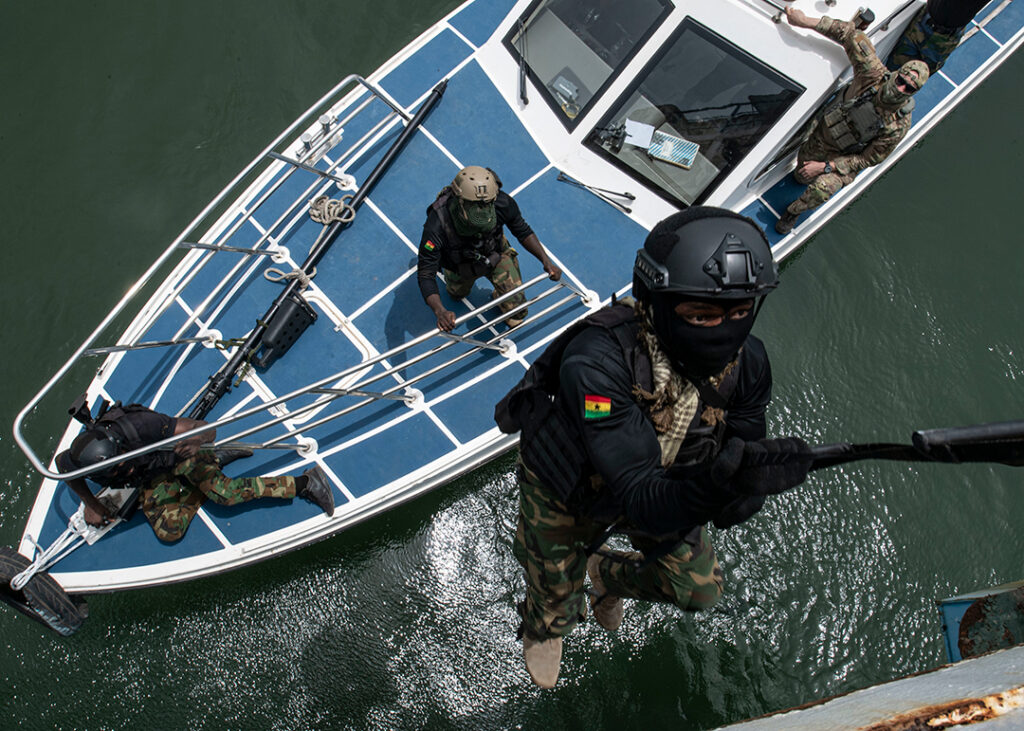ADF STAFF
A speedboat carrying eight pirates approached a Ghanaian vessel 105 kilometers off the port town of Tema.
Five pirates fired at the Ghanaian vessel before boarding it, sailing it farther south and kidnapping five crew members, according to a report by Dryad Global, which covers maritime security issues. The May incident brought the number of kidnappings in the Gulf of Guinea to 56 during five incidents in 2021.
It also underscored one reason members of the Nigerian Navy, Kofi Annan International Peacekeeping Training Centre (KAIPTC) in Ghana, the Danish government and the United Nations Development Programme gathered in May for a five-day summit in Lagos, Nigeria, to address ways to strengthen maritime security in the Gulf of Guinea.
Information shared at the conference was gathered during a three-year KAIPTC project that focused on enhancing regional maritime security. The summit was designed with input from “maritime security experts in the sub-region and reflects the most current realities on the ground,” Maj.-Gen. Francis Ofori, commandant of the KAIPTC, said in a report by Nigerian website thisdaylive.com
For decades, the region has seen a rise in maritime crime, including piracy, weapons and drug smuggling, and illegal, unreported and unregulated (IUU) fishing. Pirates attack more often where IUU fishing occurs, according to a study published by PLOS One, a peer-reviewed scientific journal.
In the first quarter of 2021, the Gulf of Guinea accounted for 43% of all piracy incidents in the African region, according to the International Maritime Bureau. In that time, 38 incidents were reported in the Gulf of Guinea, including 33 boarded vessels, two attempted attacks and a hijacked boat. The attacks have targeted cargo ships, fishing vessels and passenger boats.
In 2020, the Gulf of Guinea accounted for more than 95% of all maritime kidnappings globally, according to the bureau.
Strengthened maritime security in the Gulf of Guinea is key to enhancing economic growth for the region because the majority of trade is by sea, Denmark’s ambassador to Nigeria, Jesper Kamp, said at the summit.
“Presently, several countries are investing comprehensively in harbours and infrastructure,” Kamp said in a report on thisdaylive.com. “Nigeria, Benin, Togo, Ghana and Côte d’Ivoire among others have ambitious goals of increasing capacity of sea-borne trade within the next 5-10 years. This is necessary to support the rapidly growing West African markets.”
Ofori, the Annan center commandant, blamed ongoing unrest in Libya for increasingly sophisticated maritime attacks in the region.
“Anybody who is following the situation in Libya knows there is a proliferation of weapons in the Sahel as a result of instability in Libya,” Ofori told Nigerian newspaper The Nation. “Once these weapons find space in the Sahel, definitely they will find space in the sub-western African region along the littoral states — Ghana, Benin Republic, Nigeria, Cameroon and those along the coast.”
Nigerian Navy Rear Adm. Monday Kohwo Unurhiere stressed the need for stronger security cooperation in the region.
“It also calls for integrated capabilities, doctrine and interoperability,” Unurhiere told The Nation. “The magnitude of most maritime crimes and the interlinkages among them, coupled with the diversity of impacts they produce, has necessitated calls for co-operatively framed responses in order to match our response capabilities with the increasing crime rate.”

